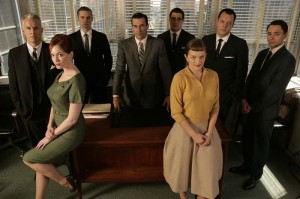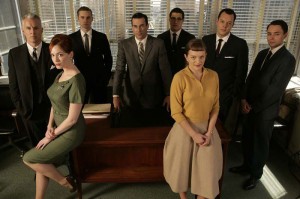Search for topics or resources
Enter your search below and hit enter or click the search icon.
April 12th, 2013 | 4 min read
By Guest Writer

Brian R. Gumm is a licensed minister in the Church of the Brethren, worshiping and periodically ministering in a United Methodist parish in rural Iowa. His telecommuting day job is Distance Learning Technology Analyst for Eastern Mennonite University in Harrisonburg, Virginia, which is where he received an Mdiv and MA in Conflict Transformation in 2012. Brian blogs regularly at Restorative Theology and can be found on Twitter.
The exchange between Nick Olson and Jake Meador on Christian engagement with the hit AMC drama, Mad Men, was helpful reading for watching the premier. I especially resonate with Olson’s sentiment of no longer feeling a desire to have a drink while watching the show. In the early seasons, the show’s aesthetics exuded a certain aura of coolness around drinking hard liquor and smoking cigarettes. But last season, that aura started to fade, laying bare the nihilism and selfishness of the show’s primary characters. Don Draper’s cool, composed gaze morphed into a cold, dead gaze.
*Spoiler alerts*
With respect to Don, this seems to be bearing itself out in the narrative that season six started. Before the premier, Olson’s assertion held up, that “(w)hen Don Draper gets in a boardroom to sell a product, he sells you on his ability to sell.” But that didn’t happen in the first episode.
The show opens with Don’s and Megan’s trip to Hawaii, which was “field work” for a potential client of the firm, a Hawaiian resort company. Upon returning to a wintry Manhattan, Don designs the creative strategy for the ad campaign, during which he’s characteristically tight-lipped, to the chagrin of Peter Campbell. When the potential clients see the proofs, Don slides into his born-salesman character and pitches them his vision for the ad campaign. The viewer expects yet another home run, but the clients don’t buy it. The copy he and his team produced strikes them as dark and morbid, even suicidal. When the potential clients leave the boardroom, Pete is exasperated while Don stares in disbelief at the copy, seemingly unable to comprehend how on earth they could have mistaken his creative vision. By the end of the episode it’s clear that Don, who through season five seemed one of the more sane characters, has started sliding back into the moral black hole from which he had crawled out of after the first few seasons.
But something else struck me about this latest episode that wasn’t mentioned in Olson’s and Meador’s conversation, namely “the frame” within which Mad Men is experienced. Their conversation focused on the show itself, which is all right and good. What I noticed happened around the edges of the show, just beyond its green curtain. In one of the commercials that played during the show,the voluptuous Joan Harris walks toward you/the camera. She picks up a glass of whiskey while describing its virtues of being “classic” and “bold,” then says as she looks you/the camera straight in the eye, “It’s Johnny Walker, and you ordered it.” You then get the company logo and the signature of Christina Hendricks, the actress who portrays Joan in Mad Men.
Here is a show that has done a fairly good job of showing the lack of any moral center that lies beneath the gloss of the world of advertising and consumerism, and now one of its actors is pitching real products during the commercial break. Not that celebrity ad pitches are new by any stretch. Far from it; the irony in this case is that it somewhat deflates the power of the show’s critical edge, however subtle it may be. When Joan sells Johnny, the bad medicine described by the show’s narrative is being prescribed to us just outside the narrative’s frame. If it doesn’t go down smooth there, why should it here?
Now, one can rightly argue, “Yes, but that’s the name of the game/necessary evil” and so forth. In a range of senses the show about advertising couldn’t exist without advertising. But treating that as inevitable and given should give Christians pause. I strongly affirm Olson’s point that “(a)esthetics and ethics are inevitably bound together,” but would add narrative to that set. And the nihilistic narrative ethics of Mad Men does a sort of deconstruction on the very frame which makes it possible in the first place, and that frame is just as “storied” as the story it brings us in the show.
It’s like philosopher Slavoj Žižek’s joke about chocolate ex-lax: Mad Men is the tasty thing which undoes itself. It’s this sort of nested auto-deconstruction which I think is brilliant about the show, and why it’s disappointing to see Joan selling Johnny. But the question has begun to dawn on me: When is enough enough?
If our (American Christians’) social imagination is coterminous with capitalism and consumer culture, then we need to learn to break open the frame of that imaginary, however briefly. And perhaps Mad Men is a site where such interventions can take place. But the renewing of our minds and disciplining of our bodies which produces the critical vision to perform such critique doesn’t come from within the world which makes Mad Men possible; it comes from the gifts of the Holy Spirit conferred upon the body of Christ through its own liturgies. Perhaps six seasons of Mad Men is giving too much, even when its fangs have supposedly been pulled.

Topics: